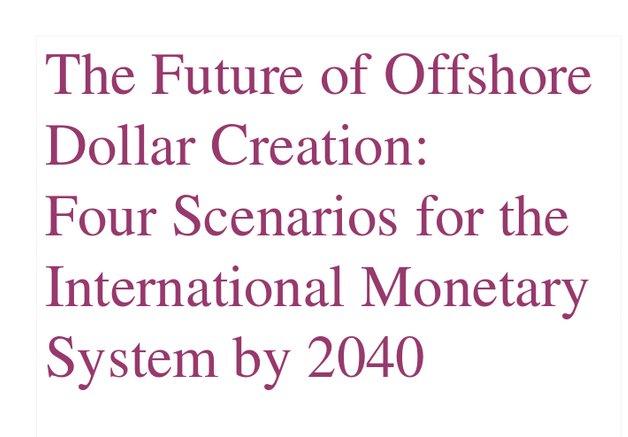I'm still mulling over yesterday's one-two punch of Venezuela's devaluation and Iran's Central Bank switching to yuan from USD on it's rate reporting platform.
This AM I re-read this paper from June, about future of the international monetary system, with fresh eyes. (Thread)

This AM I re-read this paper from June, about future of the international monetary system, with fresh eyes. (Thread)


High level summary: the authors posit that there are four potential paths the IMS can take, depending on a) whether a systemic crisis serves as a catalyst for change or not (revolutionary vs. evolutionary) and b) whether nation-states will cooperate or compete in either scenario. 

If no systemic crisis serves as catalyst, the authors postulate that either a) dollar hegemony will continue (cooperation, first screenshot) or b) competing monetary blocs will spontaneously emerge (competition, second screenshot). 



If a systemic crisis *does* serve as a catalyst, then options the authors identify are either a) a new international monetary federation (Bretton Woods II: Electric Bugaloo, first screenshot) or b) 'monetary anarchy', which is about as organized as it sounds (second screenshot). 



Why this came to mind after yesterday: what if there's a fifth option? A systemic crisis in emerging market economies - e.g. what Turkey, Venezuela and Iran have been experiencing on a much wider and longer scale - wouldn't necessarily have an effect on developed markets...
I'm starting to consider what happens when option 1b - no crisis, no cooperation - only applies to DM economies, and option 2b - crisis, no cooperation - only applies to emerging market economies.
One thing I'm sure of: the 2b diagram looks more likely today than it did in June.
One thing I'm sure of: the 2b diagram looks more likely today than it did in June.

Caveat lector: It's hard to draw conclusions from three basket case economies - and two of them petro-rentier states under sanctions, no less! - and all of a week's worth of data...
...but like I said, yesterday's news has me re-reading the IASS paper from June 2018 with fresh eyes. Here's the URL if you're into that sort of thing:
publications.iass-potsdam.de/pubman/item/es…
publications.iass-potsdam.de/pubman/item/es…
TL,DR: what if the future of the international monetary system is already here, and it's just not evenly distributed? (With apologies to @GreatDismal)
• • •
Missing some Tweet in this thread? You can try to
force a refresh











